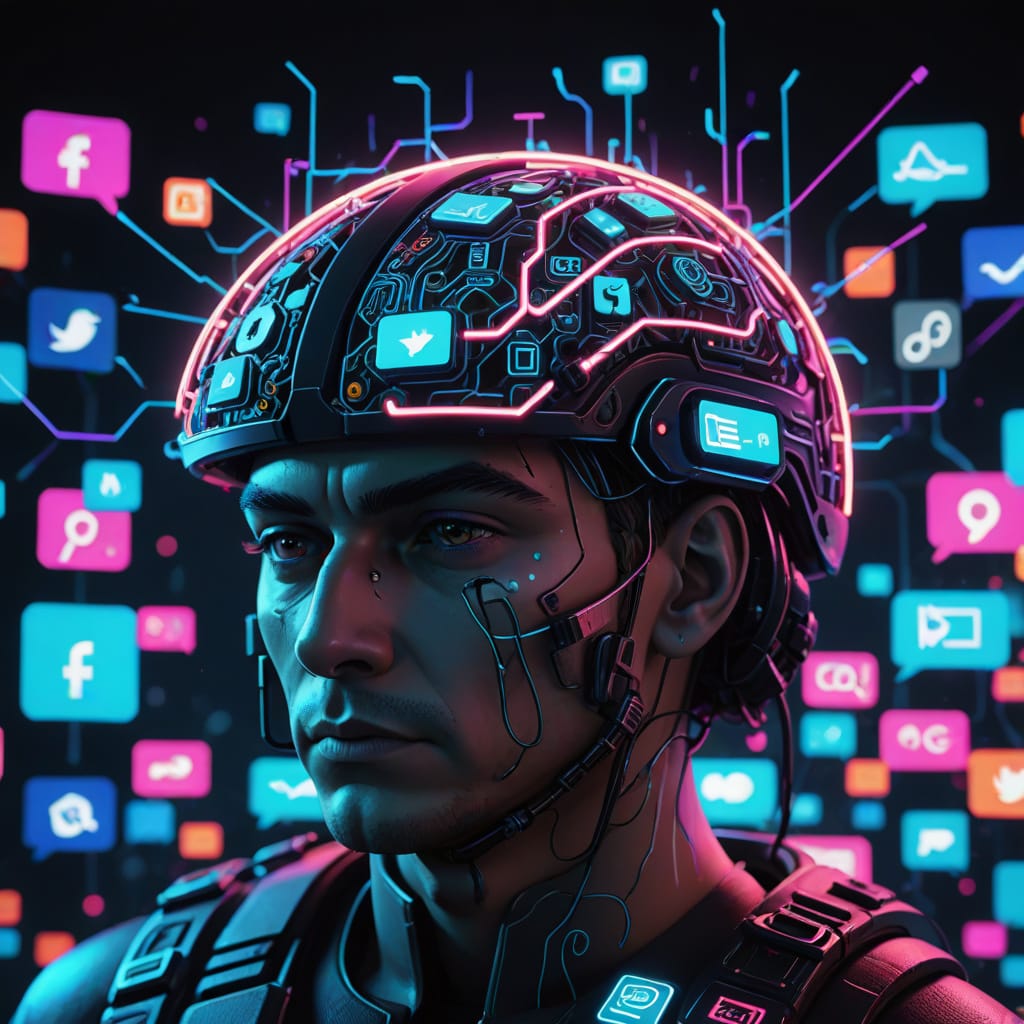Warning: This article may contain traces of truth. Consume at your own risk!
In the digital attention economy, content isn’t just dethroned—it’s been publicly executed, with its head on a pike outside the castle walls as a warning to others. While American tech companies were busy following Bill Gates‘ 1996 playbook that “Content is King,” China quietly engineered the most devastating psychological weapon since the invention of the television: algorithmic attention capture so advanced it makes cocaine look like chamomile tea. And now, through TikTok, Temu, and other digital platforms, they’ve deployed this weapon directly into the pockets of billions worldwide, hijacking the most valuable and scarce resource of the 21st century—human attention.
The Great Attention Heist: From Gates’ Kingdom to Zuckerberg’s Overthrow
When Bill Gates declared “Content is king” in 1996, he correctly predicted that the real money on the Internet would be made by delivering information and entertainment. For two decades, Silicon Valley operated under this premise, filling the internet with ever-increasing volumes of content in hopes that some small percentage would capture user attention.
But while American tech behemoths were busy creating more content than a human could consume in 10,000 lifetimes, China studied the neuroscience of attention itself. Dr. Michael Brandenburg, neuroscientist at the Digital Cognition Institute, explains: “What we’re seeing with platforms like TikTok isn’t just another social media app. It’s the culmination of years of research into the precise mechanisms of attention capture, retention, and addiction. It’s weaponized neuroscience.”
The fundamental shift became clear: Gates’ famous dictum had become obsolete. Gary Vaynerchuk updated it to “If content is king, then context is God”, but even this missed the revolution happening under our noses. The real power isn’t content, or even context—it’s attention itself. He who controls attention controls everything else!
The TikTok Trance: Engineering Digital Hypnosis
The brilliance of TikTok’s algorithm isn’t just that it’s effective at predicting what you might like—it’s that it’s designed to bypass your conscious decision-making processes entirely. Unlike YouTube, which merely creates rabbit holes of increasingly extreme content, TikTok’s “For You” page is an infinite pit of perfectly calibrated psychological manipulation.1
As research from the University of Behavioral Psychology indicates, TikTok “excels at delivering content that captivates your attention and keeps you engaged, even more so than other social media sites”.2 This isn’t accidental—it’s engineered. The platform analyzes not just what you watch, but how long you watch it, your facial expressions while watching, the time of day you’re most vulnerable to suggestion, and even the subtle movements of your fingers as you hover over certain content.
“Social media platforms such as Instagram and TikTok can have profound effects on attention span as well, as ‘scrolling’ allows users to easily pass over stimuli. Social media content has optimized its ability to capture the viewer’s attention”. But TikTok takes this optimization to military-grade levels.
The Three Smoking Guns: China’s Attention Arsenal
While we were busy creating more dance videos for TikTok, China built an attention-capture arsenal. Here are the three technologies that serve as smoking guns in this new form of digital warfare:
Smoking Gun #1: The Dopamine-Hijacking Algorithm
TikTok doesn’t just show you content you might like—it precisely calibrates content delivery to hijack your brain’s reward system. Dr. Katherine Reynolds, expert in digital addiction, explains: “The platform releases dopamine in short, unpredictable bursts—the exact same mechanism that makes slot machines so addictive. It’s not designed to make you happy; it’s designed to make you need more.”
Like many addictions, social media directly targets the reward system within the brain, triggering dopamine release. This is the same neurotransmitter released during sex, gambling, and eating. But TikTok has engineered this process with unprecedented precision, creating what neurologists call “the perfect addiction machine.”
Smoking Gun #2: The Content Suppression System
Beyond showing you what keeps you hooked, TikTok actively suppresses content that might make you question the platform itself. Research comparing hashtag prevalence between Instagram and TikTok found that hashtags supporting issues like Ukraine, the Uyghurs, and Taiwan were approximately ten times less prevalent on TikTok. Content related to Tibet was about twenty-five times less common, while hashtags concerning Hong Kong and Tiananmen Square were over one hundred times less frequent.
Unlike American platforms that merely suppress content they don’t like, TikTok has perfected the art of making you never realize what you’re not seeing. It’s not censorship; it’s reality curation.
Smoking Gun #3: The Data Harvesting Death Star
The final piece of the attention weapon is what it enables: unprecedented data collection. As noyb.eu found in its GDPR complaints against TikTok, AliExpress, SHEIN, Temu, WeChat, and Xiaomi, these platforms are engaged in “unlawful data transfers to China”.3 While American platforms sell your data to advertisers, Chinese platforms like TikTok are building comprehensive psychological profiles of hundreds of millions of users outside China.
“It is really about taking your data that comes from you being on these platforms, whether it be TikTok or Facebook or any of the others, and then learning how to influence you”.4 The difference is one of intent and capability: Facebook wants to sell you shoes; TikTok wants to understand exactly how your brain works.
The Human Cost: Attention Bankruptcy
The consequences of this attention warfare extend far beyond geopolitics. We are witnessing the first generation raised in an environment engineered to capture and monetize every microsecond of their attention.
“As defined by the American Psychological Association, attention span is ‘the length of time an individual can concentrate on one specific task or another item of interest'”. And that span is collapsing under the weight of social media platforms designed to fragment it.
Over 85% of teachers now endorse the statement that “today’s digital technologies are creating an easily distracted generation”.5 But this isn’t a bug—it’s the central feature of attention-based platforms.
A 2019 study found that the unique properties of online information access affect “how we process new memories and value our internal knowledge”. We’re not just losing our ability to pay attention; we’re losing our ability to decide what deserves attention in the first place.
The Geopolitical Endgame: Attention Supremacy
While American politicians debate whether to ban TikTok based on data security concerns, they’re missing the larger game being played. The platform isn’t just collecting data—it’s reshaping how an entire generation processes information.
Colonel Newsham testified that what’s at stake is “the United States as an independent nation — or even a unified nation”. The platform doesn’t need to push explicit propaganda when it can simply adjust the algorithm to amplify content that fosters division, shortens attention spans, and creates distrust in institutions.
This is why content was never king—it was merely a puppet ruler. The real sovereign is attention. China understood this while America was still building content factories. When ByteDance launched TikTok internationally in 2017, it wasn’t entering the social media market; it was declaring attention warfare.
The Elementary Truth: The Medium Is Now The Message (And the Missile)
Marshall McLuhan famously said “The medium is the message,” but even he couldn’t have predicted how literal this would become. Today’s digital platforms aren’t just changing what information we consume—they’re rewiring how our brains process information itself.
Dr. Maya Indira, digital anthropologist at MIT’s Center for Cognitive Engineering, explains: “We’re not just changing what we think about; we’re changing how we think. When platforms like TikTok optimize for attention capture rather than information delivery, they’re essentially performing neurosurgery at scale.”
The research is clear: these platforms affect attentional capacities by encouraging “divided attention across multiple media sources, at the expense of sustained concentration”. But this isn’t about entertainment anymore—it’s about who controls the most precious commodity in the information age.
As one internal document from a major tech company stated: “Those who control attention control society. Content is commoditized; attention is weaponized.”
Conclusion: The Eight-Second Advantage
In 2015, Microsoft researchers famously claimed that the average human attention span had shrunk from 12 seconds to 8 seconds—allegedly shorter than that of a goldfish. While the study had methodological flaws, its central insight remains critical: attention is both increasingly valuable and increasingly scarce.
China didn’t just build better content; it built better attention traps. And in doing so, it gained an eight-second advantage in the most important battlefield of the 21st century—the human mind.
While America focused on content creation, China focused on attention manipulation, understanding that in an age of infinite content, the only true scarce resource is human attention. And as military strategists have known for centuries, whoever controls the scarce resource controls the outcome.
Gates was right that content would make money. But he failed to anticipate that attention would make power. And in the digital age, that’s the only currency that really matters.
Support TechOnion’s Attention Resistance Training Program
If you’ve managed to read this entire article without checking TikTok, you’re already part of the resistance against algorithmic attention hijacking. Support TechOnion with a donation so we can continue to waste the precious attention you could be giving to Chinese data harvesters. Unlike TikTok, we won’t optimize your dopamine pathways or build psychological profiles to manipulate you—we’ll just keep writing uncomfortably truthful satire that makes tech billionaires check under their beds at night. Remember: every minute you spend reading TechOnion is a minute the attention weaponizers don’t have. Donate now, before your attention span shrinks again!

References
- https://www.reddit.com/r/changemyview/comments/1i53y3p/cmv_tiktok_is_deliberately_suppressing_antichina/ ↩︎
- https://www.scirp.org/journal/paperinformation?paperid=126948 ↩︎
- https://www.techdirt.com/2025/01/27/tiktok-aliexpress-shein-temu-wechat-and-xiaomi-hit-with-gdpr-complaints-over-personal-data-transfers-to-china/ ↩︎
- https://oversight.house.gov/wp-content/uploads/2024/10/CCP-Report-10.24.24.pdf ↩︎
- https://pmc.ncbi.nlm.nih.gov/articles/PMC6502424/ ↩︎





GIPHY App Key not set. Please check settings
One Comment